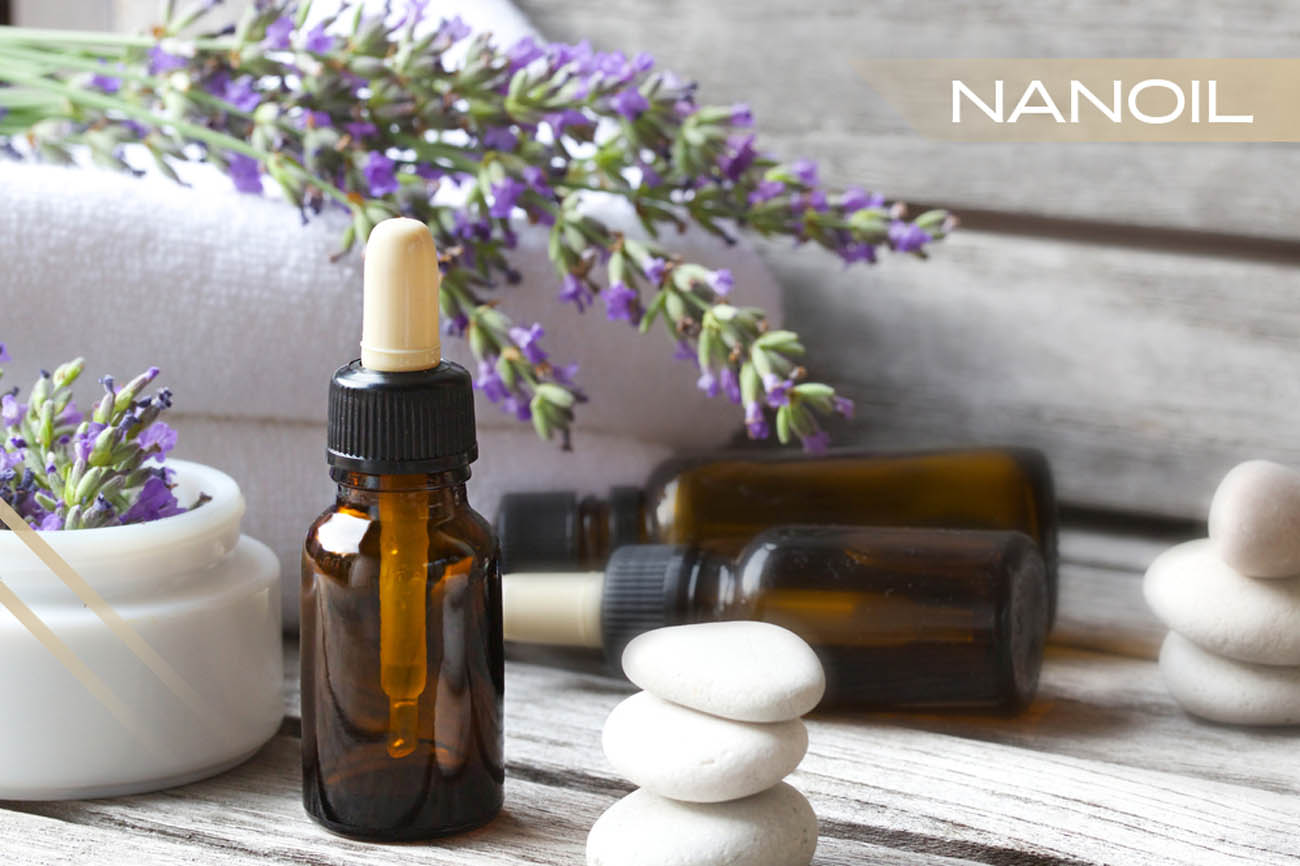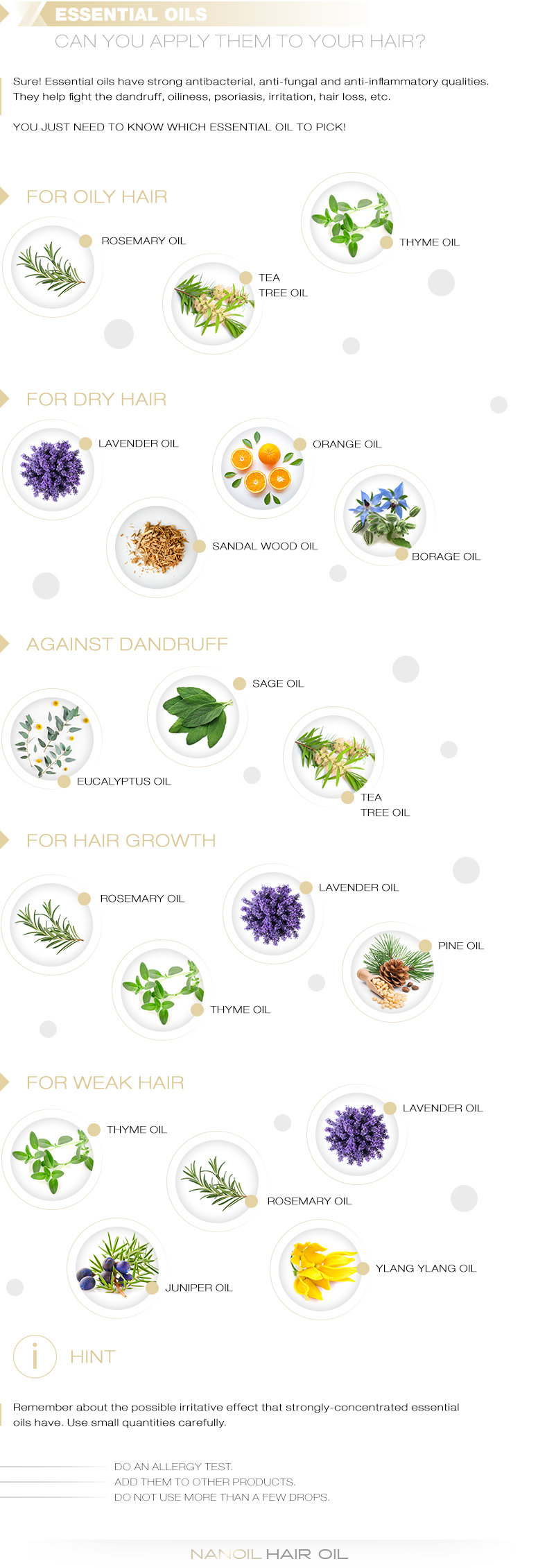- NANOIL Products
- Oils
- Face serums
- Hair masks
- Shampoos
- Hair conditioners
- Hair styling
- Care
- Hair Porosity Test
- Blog
- Contact

There are dozens of them. Essential oils. Apart from carrying the most stunning aromas and having therapeutic power, they can condition your skin and hair. What are the benefits of essential oils? Check and find out how to make the most of them in your beauty routine, avoiding unwanted irritations.
We like to reach out for natural hair and scalp care products because we realize that what’s best, comes from nature. Still, does natural always equal safe? There is a lot of controversy surrounding essential oils – even though they are popular in beauty care and found in many hair products, some people warn against their harmfulness. What’s the truth?
If you want to catch up on essential oils and the way they work, you need to know their properties and check how they are different from other oils.
They are strongly-concentrated fragrant substances which are extracted from fresh or dried plants. An essential oil can be extracted from the leaves, flowers, seeds, stems, roots and bark. How come? It is extracted through the steam distillation of chosen parts of a plant. However, there are other ways to extract essential oils, including filtration, phytolisation or extruding.
The way of extracting essential oils has an influence on their consistency. They are not oily, they are liquid and look like watery serum rather than oil. A fun fact is that hydrosols are the by-products of essential oil production.
Essential oils can be used in hair care because they make up a concentrated blend of various compounds. However, not the ones which can be found in natural cold-pressed oils. Instead of lipids, vitamins and minerals, every essential oil is mostly made up of aldehydes, esters, ketones, alcohols and terpenes.
Nevertheless, essential oils have remarkable therapeutic and healing properties. Apart from being used in aromatherapy (fragrance concentrate), they are used in cosmetics because:
While discussing the benefits of essential oils, you should know that they don’t dissolve in water but they bind with fats and alcohols. This is what makes them common in the perfume industry.

Natural essential oils are most common in perfume because the essence of a particular plant – its wonderful aroma – is captured in the oil. Thanks to this property, essential oils are popular in aromatherapy, baths or massages in order to let your relax and calm your nerves after a hard day.
However, we reach out for essential oils in hair and body care more and more often. Due to their antibacterial and anti-fungal properties, they are mostly recommended for problematic scalp and hair.
Some people highlight that being careful while using essential oils for hair and skin is the key thing to avoid the irritative effect. Too bad, they’re right.
All essential oils must be used in scarce. They are active and contain large amounts of concentrated substances thus may be irritative especially for sensitive skin and scalp. To make sure that a given essential oil won’t hurt you, you should:
Tea tree oil – acts against bacteria, fungi and viruses, therefore, it’s added to anti-dandruff and scalp-cleansing products.
Eucalyptus oil – hinders the bacteria, it also gives a very pleasant feeling of freshness so it’s mostly found in shampoos.
Lavender oil – probably the most popular essential oil, it has an antiseptic effect, soothes scalp irritation, heals inflammation, fungus infections and dandruff, may reduce hair loss.
Peppermint oil – apart from being antiseptic, it works like an astringent, alleviates, adds freshness, which makes it a popular ingredient in strong clarifying shampoos.
Rosemary oil – even though rosemary makes us think of cooking, it works as an antiseptic and stimulates blood flow, therefore it can reduce hair loss.
Lemon oil – has a mind-blowing citrus aroma but apart from that it kills bacteria and fungi, works as an astringent and freshens up so you should search for it in shampoos ad rinses for dandruff-affected hair.
Orange oil – another citrus essential oil which has bacteriostatic effect, therefore it’s a good choice while treating skin infections, locking moisture in scalp and regenerating. That’s why it gives great results when used in hair treatments.
Neroli oil – a bit of citrus aroma, a bit of flower fragrance for the soothing and normalizing effect which blocks seborrhea.
Sweet flag oil – one of the less common essential oils. It doesn’t seem to make much sense as it has intensive anti-inflammatory power and improves blood circulation, conditioning greasy hair which tends to fall out in excess.
Cedar oil – an ethereal version of pine oil. It has stronger aroma-therapeutic and antiseptic power.
Sage oil – extracted from the leaves of sage, the oil works amazing in shampoos for oily hair because not only does it have anti-inflammatory, astringent and antiseptic effect but also blocks sweat and the development of pathogen germs.
Bergamot oil – supports the anti-dandruff and sebum secretion treatment thanks to the antibacterial, antifungal and antiseptic action, it also accelerates healing of damaged epidermis e.g. in people suffering from psoriasis.
Camomile oil – famous camomile in form of an essential oil heals inflammation and brings relief so it’s common in products reducing redness and scalp irritation.
Many people have no idea how to pick essential oils. Moreover, many of the oils are similar so we rarely know which one’s made for us.
Choosing ready-made products infused with essential oils is the easiest way – shampoos, conditioners, scalp lotions and hair rinses. It is often a better solution because purchasing an essential oil can be pricey due to difficulties in producing the ingredient – for instance, making one litre of high-quality rose oil requires sacrificing as many as 200 flowers! Besides, when you get an off-the-shelf product, you don’t need to worry if it’s right for you.
Despite the above, you should definitely make use of pure essential oils in your hair care. You can solve lots of hair problems using them on condition that they come from the good source and you apply them the right way. Yes, right, how to use essential oils for your hair and scalp? Take a look at the easiest ways.
When we decide on trying hair oil treatments, we usually go for natural cold-pressed vegetable oils. Even though essential oils fulfill this purpose as well, you can’t use them separately – they should be added to a base (carrier) oil. Coconut oil or argan oil can be the base for your hair oil treatment. They are both amazing carriers for nutrients, working for low porosity hair (coconut) or medium/high porosity hair (argan). Essential oils can be used for at-home scalp and hair treatments.
Already during a hair wash, you can introduce essential oils which both condition your scalp and help keep it clean. If your shampoo is free of essential oils, feel free to add them. 10 drops of a chosen essential oil works for 100 ml of any shampoo – the peppermint oil leaves a nice fresh mint aroma.
Very popular herbal rinses are quite problematic when it comes to preparation; you must properly infuse the herbs and cool them down. On the other hand, making an essential oil hair rinse is a piece of cake. Add a few drops of a chosen essential oil and a little milk (emulsifier which keeps the oil from floating on the water surface) to one liter of lukewarm water. Use the mixture for rinsing hair after every wash, rubbing it in your scalp, too.
Comments: #0